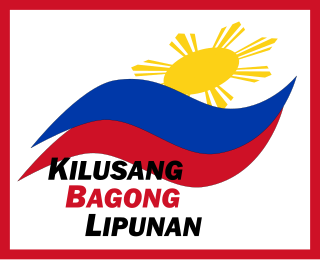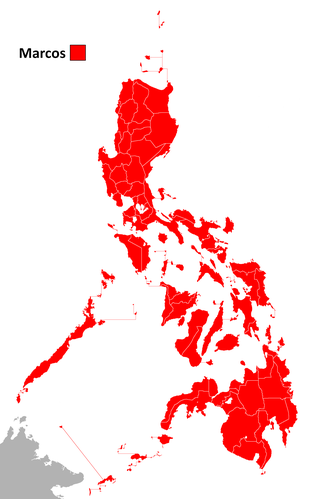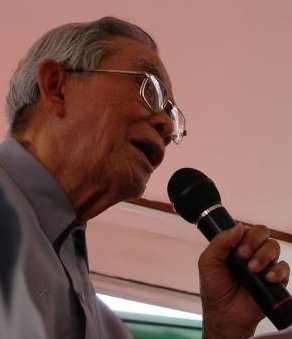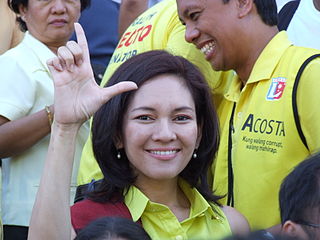
The People Power Revolution, also known as the EDSA Revolution or the February Revolution, was a series of popular demonstrations in the Philippines, mostly in Metro Manila, from February 22 to 25, 1986. There was a sustained campaign of civil resistance against regime violence and electoral fraud. The nonviolent revolution led to the departure of Ferdinand Marcos, the end of his 20-year dictatorship and the restoration of democracy in the Philippines.

The 1992 election of members to the Senate of the Philippines was the 24th election to the Senate of the Philippines. It was held on Monday, May 11, 1992. This was the first general election under the 1987 Philippine Constitution. An estimated 80,000 candidates ran for 17,000 posts, from the presidency all the way down to municipal councilors.

The New Society Movement, formerly named the New Society Movement of United Nationalists, Liberals, et cetera, is a right-wing political party in the Philippines. It was first formed in 1978 as an umbrella coalition of parties supporting then-President Ferdinand E. Marcos for the Interim Batasang Pambansa and was his political vehicle during his 20-year regime. It was reorganized as a political party in 1986, and is the furthest to the right of the political spectrum among active parties after Marcos' ouster.

The 1981 Philippine presidential election and national referendum was held on June 16, 1981. President Ferdinand E. Marcos of the Kilusang Bagong Lipunan (KBL) defeated retired general and World War II veteran Alejo Santos of the Nacionalista Party in a landslide victory. Most opposition parties boycotted the election as a sign of protest over the 1978 election for the Interim Batasang Pambansa, which they condemned as fraudulent. At the same time, a national referendum was held on the question in holding elections for barangay elections in 1982.

The United Nationalist Democratic Organization (UNIDO) was the main political multi-party electoral alliance of the traditional political opposition during the turbulent last years of Philippine President Ferdinand Marcos in the mid-1980s. It was formed in January 1980, and was originally known as the United Democratic Opposition from 1980 to 1982. It was initially a union of eight major and minor political parties and organizations with the main aim to oust President Marcos through a legal political process. In April 1982, the coalition received its present name, and increased its members to twelve parties. Shortly after the assassination of popular opposition senator Benigno Aquino Jr., the party was led by Senator Salvador Laurel of Batangas.

A parliamentary election was held on May 14, 1984, in the Philippines. Like past elections, charges of bribery, protests and complaints on irregularities marred the elections. Former Manila Times publisher Chino Roces and former senator and opposition leader Jose W. Diokno supported the campaign boycotting the election. The National Movement for Free Elections (NAMFREL) helped mitigate electoral fraud during the election.
Ninoy Aquino Day is a national non-working holiday in the Philippines observed annually on August 21 commemorating the assassination of Senator Benigno "Ninoy" Aquino Jr. He was the husband of Corazon Aquino, who later became Philippine President; His assassination led to the downfall of the dictator and kleptocrat president of the Philippines Ferdinand Marcos on February 25, 1986, through the People Power Revolution. Since 2004, a commemoration ceremony is traditionally held that was attended by presidents Gloria Macapagal Arroyo, Fidel V. Ramos and Benigno Aquino III.

The 1987 election of members to the Senate of the Philippines was the 23rd election to the Senate of the Philippines. It was held on Monday, May 11, 1987. The Philippine Senate was re-instituted following the approval of a new constitution in 1987 restoring the bicameral Congress of the Philippines; earlier, a constitution was approved in 1973 that created a unicameral Batasang Pambansa (parliament) that replaced the bicameral Congress. The last Senate election prior to this was the 1971 election.

The Fourth Philippine Republic, also known as the FourthRepublic of the Philippines was established after Ferdinand Marcos Sr won the June 16, 1981, Philippine Presidential Election. Marcos announced the beginning of the Fourth Republic on June 30, during his inauguration speech. On February 25, 1986, due to the 1986 EDSA Revolution, Marcos ended into exile in Hawaii and Corazon Aquino became the 11th president of the Philippines. The Fourth Republic would come to an end under Aquino's leadership, and the Fifth Republic would commence with the adoption of a new constitution.
Lakas ng Bayan, abbreviated as Laban, was a political party in the Philippines formed by Senator Benigno "Ninoy" Aquino Jr. for the 1978 Interim Batasang Pambansa regional elections. The party had 21 candidates for the Metro Manila area, all of whom lost, including Ninoy. The party's acronym (LABAN) is a Filipino word meaning "fight".

The Laban sign is a Filipino hand gesture made by extending the thumb horizontally and the index finger pointing up, leaving the other fingers closed to create the letter L, which stands for laban. It is sometimes mistaken for the mildly offensive Western "loser" and "raised gun" gestures, to which it is unrelated.
The Grand Alliance for Democracy (GAD) was a political multi-party electoral alliance during the 1987 Philippine legislative election. The coalition opposed the policies of incumbent president Corazon Aquino and her Lakas ng Bayan (LABAN; People's Power) coalition, while severing ties with ousted president Ferdinand Marcos. The coalition consisted mostly of defectors from the Kilusang Bagong Lipunan (New Society Movement), Marcos' political party, the Nacionalista Party and the United Nationalist Democratic Organization, the coalition that supported Aquino during the 1986 presidential election.

Presidential and vice presidential elections, legislative elections and local elections were held in the Philippines on May 11, 1992. An estimated 80,000 candidates ran for 17,000 posts from the presidency down to municipal councillors in the first general election under the 1987 Constitution. Even though she was permitted by the Constitution to run for a second term, President Corazon Aquino did not stand for re-election.

Elections for the House of Representatives in the Philippines were held on May 11, 1987. This was the first legislative election since 1984, the first House of Representatives elections since 1969, and the first election since the People Power Revolution that overthrew president Ferdinand Marcos and brought Corazon Aquino to power after alleged election fraud by the former during the 1986 presidential election against the latter.
1978 in the Philippines details events of note that happened in the Philippines in the year 1978.
The Aquino family of Tarlac is one of the most prominent families in the Philippines because of their involvement in politics. Some family members are also involved in other fields such as business and entertainment.
Natalio Bacus Bacalso was a Filipino writer, newspaperman, radio broadcaster, filmmaker, Constitutional Convention delegate in 1971 representing Cebu's 2nd district, and opposition assemblyman to the Interim Batasang Pambansa in 1978. The Natalio Bacalso Avenue is named after him. On June 13, 2019, The Freeman recognized him as one of the Top 100 Cebuanos.

Napoleon "Nap" Genson Rama, PLH was a Filipino Visayan lawyer, journalist, and writer in English and Spanish from Cebu, Philippines. He was the Vice President of the 1971 Constitutional Convention and the Floor Leader of the 1986 Constitutional Commission. In 2011, he was awarded the Philippine Legion of Honor, the country's highest recognition, with the rank of Grand Commander on the 25th anniversary of the EDSA 1 Revolution by President Benigno S. Aquino III.

In the Philippines during the dictatorship of Ferdinand Marcos, groups and individuals which opposed the regime without subscribing to leftist ideology were usually labeled with the terms "middle force," "third force," the "mainstream opposition," or more rarely, as the "conservative opposition." Mostly consisting of middle class and upper class groups which had been apolitical when Marcos first declared martial law, the most prominent examples of oppositionists in this category include religious groups, business sector groups, professional groups, social democrats, academics, journalists, and artists. Politicians from the traditional opposition are also sometimes counted in this category, although the terms are traditionally associated with ground level opposition, rather than political opposition per se.















